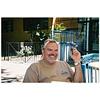Blame it on the Moon
Every man is like the moon, both sharing a dark side
Unseen, unspoken truths of them where sin is stuffed to hide
Ever changing, waxing, waning, full, and even gone
It drives the tides of Earth and man through dusk and day and dawn
Seen or not, it’s always there and fills our nighttime air
Some say that when it’s New and dark, it’s lurking in its lair
While restless souls come out and play, New moon remains concealed
Until the time when secrets drop and all will be revealed
Richard Eugene Craft
My name is Richard Eugene Craft. I’m sixty-something as I write this, and I live alone in a haunted house. I came here to write the great American novel. The house is in Northern Virginia, Arlington. Today it’s an unusually quiet setting. The land and house are almost an eerily sheltered piece of history. Wandering through the buildings or grounds, a person could easily be back in the mid-1800s.
It’s a typical large farmhouse, with three floors, including the attic. A concrete pad was poured out front in the middle of the gravel driveway in the 1960s. A basketball rim and hoop still stand there as a nod to half-court games between my brother and me. I keep a basketball by it ready to go for those few and far between times when I pretend I’m exercising.
The original flooring in the house is planks of elm wood, saturated in the DNA of untold numbers of soldiers as they bled out and died there during the Civil War. Those floors have been sanded, sealed, and polished in subsequent upgrades to the house, but the blood in their grain will always be there. No doubt this is why the house is presumed to be haunted. How could it not be?
Tom
It was a dark and stormy night. I’d never use that in my writing, but it was a dark and stormy night when the house relationship entered a new phase. It wasn’t raining, but the thunder was booming and the lightning was flashing when I heard the ping, ping, ping of the basketball out front. I was back in one of the downstairs rooms preparing to turn it into an office. My desk was currently active in the main hallway of the house, and I was hoping to move that clutter in case I ever hosted visitors.
My brother’s gun was in the top desk drawer, and I picked it up as I passed. It was an impressive piece, a Ruger .357, six-inch barrel, nickel plated. It hailed from 1976 and had an engraving on the barrel: “Made in the 200th Year of American Liberty.” Surely that would scare off any ghost.
The switch for the outdoor floodlights was located in the canning kitchen behind the small kitchen. I turned on the lights along the way, the hall, the small kitchen, and the canning kitchen. I could still hear the basketball at play as I turned on the floods, and then, aside from the brewing storm, things went silent. When I walked back through the small kitchen and main hall to the front of the house, the basketball court was empty, with the basketball lying right where I always left it. Situation normal.
I decided to return to my chores in the future office room. I also decided to take the gun with me. I couldn’t imagine using it, but it seemed like the right idea at the time. I was taking apart one of two twin bed frames when I heard a new sound. I could swear someone or something was fumbling through the drawers in the kitchen. The gun and I stepped back into the hall. The lights from the kitchens and the outdoor floodlights weren’t on. I hadn’t turned them off, and the switches were all inside the house.
I was uncomfortable that I was having one of those high-anxiety moments as I moved forward in the dark with a gun in my hand. I kept my finger off the trigger.
The kitchen noise, the basketball, and all of the thunder and lightning had ceased. I don’t think I had known a moment so completely absent of light and sound since I had been here.
I felt the presence before I saw it. A figure was slowly emerging from the darkness of the kitchen area, his bare feet shuffling over the stained planks of history. As it grew closer it appeared as a Black man wearing only tattered shorts. He had a small kitchen knife in his right hand. He hadn’t seen me yet. I was petrified. Should I run? Should I shoot? Should I play dead? I chose to speak, loudly.
“Who are you and what are you doing here?” I shouted. My eyes had adjusted to the dim light by now, and I saw a young man jump at the sound of my voice, obviously as terrified and surprised as I was. “Why do you have a knife?” I continued. “If you think you’re going to kill me, I promise I’ll shoot you dead right where you stand.” I was shaking badly. I hope he couldn’t read the fear behind my bluster.
“Oh my God, Dr. Craft, please don’t shoot, it’s me, Tom. I’d never kill you.”
“I don’t know who you are Tom, or where you came from, but if you don’t get rid of that knife, I’ll be taking it from your dead hands.” I don’t know where I found the guts to go all Dirty Harry at this moment. I was so scared I thought I would shit myself.
“No knife,” he said as he moved very slowly to place it on the desk in the hallway. “No knife” he repeated as he raised his hands.
“Sit in that chair.” I didn’t want him on his feet, able to quickly make any moves.
“I’m sitting, Dr. Craft, I’m sorry if I scared you. I was just going to peel an apple in the kitchen. I’d never kill you, but others are coming, one that would kill you.”
“How do you know who I am?”
“Dr. Craft, are you okay? It’s me, Tom. We’ve been knowing each other for years.”
“Where are you from?” I asked.
“Right here, Dr. Craft. I live in the root cellar. I’ve been staying there since the war let up and sister Betty died.”
I was suddenly very dizzy. Dr. Craft, the war, Tom and Betty.
“What year is it, Tom?” I asked, afraid of the answer.
“Why, it’s 1866,” Tom said as he evaporated before my eyes.
I started a journal that night.

